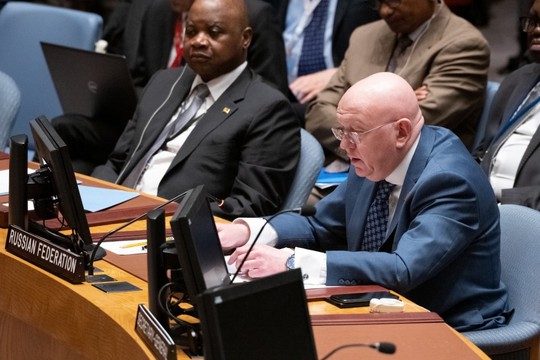Photo: Permanent mission of the Russian Federation to the UN
Statement by Permanent Representative Vassily Nebenzia at UNSC debate "Peacebuilding and Sustaining Peace: Futureproofing Trust for Sustaining Peace".
There are some important points:
- In a situation when a deep-reaching divide among UN member states manifests itself clearly and when joint efforts are needed to overcome the crisis and create a renewed, more sustainable international security architecture, the issue of a lack of trust and unifying agenda becomes more relevant.
- Speaking of trust, we cannot fail to mention the perfidious steps of our former Western partners. Over the past 15-20 years, they managed to eradicate all prerequisites for mutual understanding and cooperation that emerged after the end of the Cold War. I mean the forsaken promises about NATO’s non-expansion to the East, the promotion of so-called color revolutions and regime changes, the attempt to impose “rules-based order” in place of the international law and respect for the UN Charter.
- Thanks to their efforts, we live in a world where truth means nothing, where West-controlled mass media is used to disseminate false and hateful narrative, and where white is said to be black and vice versa.
- Of course, I mean the situation in Ukraine in the first place, which role the US and its allies have reduced to that of a bargaining chip in the geopolitical confrontation with Russia. For that purpose, in the course of 8 years they have created a Russophobic neo-Nazi dictatorship right at our borders that declared a war on everything Russian and everything that objectively connected us. It has come to the point where NATO is fighting a proxy war against Russia, which is fraught with most negative implications for the entire humanity. What trust can we be talking about at all in such circumstances?
- It is also obvious that the steps of the West directly affect the prospects for interaction among the leading global actors in the context of resolving regional crises. For Western countries, who project this on a competition with Russia and China, this is a zero-sum game. We strongly disagree with this approach.
- This situation in global affairs also has a bearing on the work of the Security Council and other international platforms. We see deep-reaching contradictions on a large number of items under discussion in the General Assembly as well. All of this puts the UN system to a serious resilience test and affects the effectiveness of implementation of its main mandate in the field of conflict prevention and sustaining peace.
- One of the key signs of this situation is the crisis in fulfilling prior agreements and arrangements, as well as resolutions of the main UN bodies. If those arrangements stop meeting the interests of Western states – facts of incompliance become downplayed, and the documents themselves may be declared irrelevant or rejected for good.
- The crisis of trust also influences the institute of mediation. These trends clearly presented themselves in the situation with the Minsk Agreements on Ukraine and the role of Germany and France in making that deal. Paris and Berlin not only failed to push Kiev to comply, but even acknowledged that the Minsk Agreements were only meant to give the Kiev regime some time to prepare for a war.
- Unfortunately, those trends are not limited to separate states, but affect the work of the United Nations as well. Recently, we have seen a decline of confidence in the United Nations as an organization that should represent interests of all states, be a showcase of impartiality and integrity, and have all its personnel strictly guided by Article 100 of the Charter.
- We see this not only at the political or human rights track, but also on the ground in host countries of UN missions, i.e. at the exact level where the political agreements that have been made must be implemented.
- Special attention should be given to the problem of the growth of “disinformation and false information” regarding the UN, which has been so actively discussed at various UN venues recently. This problem, in our opinion, requires a comprehensive approach.
- Negative feedback is not always an attempt to tarnish the reputation of the United Nations. Partly, these critical assessments are evidence of the disappointment of host states and their populations. These concerns should not be left without attention. On the contrary, UN peacekeeping missions need to elaborate on their mandates, reach out more actively to local populations through media, and implement local quick impact projects. This can help establish constructive interaction with the host country and boost confidence, which will ultimately strengthen the UN authority.
- It is also important to return to the culture of consensus building which has been seriously undermined lately. We have set out this position in our contribution to the Secretary-General's New Agenda for Peace and expect our approaches to be taken on board.
read more in our Telegram-channel https://t.me/The_International_Affairs

 10:20 05.05.2023 •
10:20 05.05.2023 •























